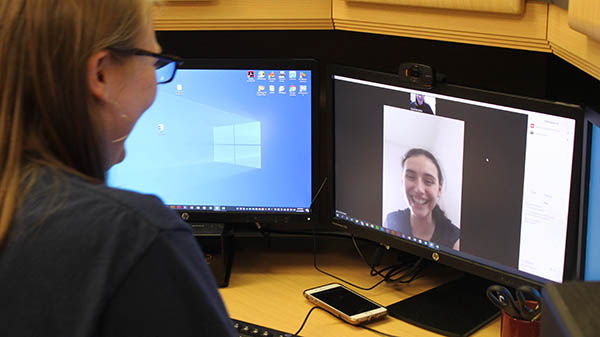Bible studies. Worship services. Small groups. Chapel services. Accountability groups. Bible courses.
Students at private Christian universities can load their plates with an endless buffet of “spiritual food.”
Yet when they take in all that soul food without exercising their faith, it can lead to “spiritual obesity,” said April Robinson, minister to students in the area of community and campus involvement at Samford University in Birmingham.
It’s easy for students to soak up the resources on campus without getting out into the community and exercising their faith. Campus becomes what many students refer to as a “bubble.”
“All students in that age range (18–24) have to work hard to see beyond their immediate life,” Robinson said.
She added that on a Christian campus, the constant community of believers multiplies the challenge. “It can be ironic that Christians tout the gospel — which talks about going and making disciples — but we can become very insulated in our faith,” Robinson said. That’s why Samford University Ministries pushes students to get off campus and into the community, she said. It partners with neighborhoods to offer long-term service projects for students to participate in. “We want to encourage students’ inner life with Christ but also want to encourage an external relation of faith,” she noted.
Scott Bullard, assistant professor of religious studies at Judson College in Marion and former director of campus ministries, said he tries to quell some of the frustration students express about the insulation they feel on a Christian campus.
“They’ve been given the gift of time to pull away from society to think and to learn,” he said. Yet Bullard said serving the community is a calling from God expressed in the entire narrative of the Bible. “This isn’t the icing on the cake; it’s the cake. I don’t see it as optional for Christians to serve,” he said.
One way Judson helps students answer the call to serve is through Restoration, a one-week missions trip initiated by a few students who wanted to use their free time to engage the community. Students stay on campus an additional week at the close of the semester and work on service projects in Marion.
Furthermore professors can apply for funds to take service-based trips related to their coursework through the office of faith-based service-learning. Criminal justice students might visit prisoners, and education students might lead tutoring programs.
“I have enjoyed the way service-learning brings different groups of people together. I have worked with young children, teens, the elderly and people of different races and backgrounds. I have come to learn that while there is so much diversity, we all have basic human needs that need to be fulfilled,” one student wrote on the faith-based service-learning blog.
Megan Hunter is the campus ministries coordinator at the University of Mobile (UMobile). As a recent graduate, she experienced firsthand how easy it is to get into a “bubble” of believers and forget to engage the lost on campus. She said the campus ministries staff encourages students to “live missionally” and form relationships with the unbelievers they might not know at UMobile.
“If you just surround yourself with believers all the time, you’re not living out the gospel,” Hunter said, explaining that Jesus ate with tax collectors and sinners.
UMobile campus ministries tries to host service projects and events that anyone would feel comfortable attending on campus, regardless if they are believers or not.
Non-Christians feel comfortable coming to serve the community, and it opens up doors to “explaining the bigger picture of Christianity and what the Bible says about service and love,” Hunter said.
Schools like Judson, UMobile and Samford provide unique opportunities for students to get out of the “bubble” and live out their growing faith through missions and service projects. “It’s helpful in getting students outside of their comfort zone. A lot of our students are white, upper or middle class, Baptist young women, and it’s the first experience they have had with diversity and poverty,” said Susan Jones, director of faith-based service-learning at Judson (see story, page 9).
Students return to campus and reflect on how the service impacts their spiritual lives, Jones said, noting that on campus, they can be nourished with spiritual food to prepare them for more service. Robinson added, “Going out into the community can become toxic without a healthy life of worship, study and prayer. A life of worship, study and prayer can become sterile and stagnant without any outreach.”
This need for balance leads Robinson to encourage students to think of their faith in terms of fitness: “Be mindful of what you’re taking in and what you’re working out.”





Share with others: